Turkey's new self-confidence
Adelina Marini, July 12, 2011
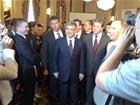 "Turkey is the 6th largest economy in Europe. We are a G20 country. Last year we had 8.9% economic growth. In the first quarter of 2011 we have registered 11% growth. Our banks and bank system are very healthy. Turkey is a huge market. Regarding spending - we have a budget of 1 trillion dollars. [...] Ladies and gentlemen, do treat Turkey as your home. Follow the developments in Turkey closely and benefit from its opportunities the best way you can". These words belong to Turkish President Abdullah Gul, uttered during the closure of a Bulgarian-Turkish business forum in Sofia on July 11.
"Turkey is the 6th largest economy in Europe. We are a G20 country. Last year we had 8.9% economic growth. In the first quarter of 2011 we have registered 11% growth. Our banks and bank system are very healthy. Turkey is a huge market. Regarding spending - we have a budget of 1 trillion dollars. [...] Ladies and gentlemen, do treat Turkey as your home. Follow the developments in Turkey closely and benefit from its opportunities the best way you can". These words belong to Turkish President Abdullah Gul, uttered during the closure of a Bulgarian-Turkish business forum in Sofia on July 11.
Gul was on a 2-day official visit in Bulgaria, bringing with him a huge delegation of Turkish businessmen. It was economic cooperation that was in the centre of the official visit, although the Bulgarian side tried, not very convincingly though, to raise the energy issue too. Turkey's economy is growing indeed rapidly, as the official data show that this year it even surpasses China's economy. Not a few experts have been warning for months of a serious risk of overheating, but for now the Turkish government denies this risk and leads an aggressive policy of expansion.
Bulgaria - a door to Europe
"Turkey's goal is by 2023 exports to reach 500bn euro", Yalçın Egemen said, chairman of the Turkish-Bulgarian Business Council, at the forum. In order this to happen, though, it is necessary a process of visa liberalisation to start. This was the topic raised by absolutely all Turkish representatives both from the business circles and the government during the forum. All of them quoted one and the same 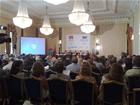 argument - you need investments, Europe needs investments, you are suffocating with the crisis and the population is getting older, we are not and we offer help but the visas are a big problem.
argument - you need investments, Europe needs investments, you are suffocating with the crisis and the population is getting older, we are not and we offer help but the visas are a big problem.
The problem with visa liberalisation is being raised by Ankara every time it has a chance, mostly during the accession negotiations with the European Union, which the country started in 2006 but which are practically frozen. Turkey deems that it is a subject of double standard, since countries with EU membership ambitions in the Balkans get visa liberalisation, while Turkey does not.
The visa regime can be basically divided into two parts, which are intertwined. The first is a bilateral problem (Turkey-Bulgaria) and the other is related to the application of Schengen acquis. The main requirement of the Turkish government and business is at least a privileged circle of Turkish citizens to be subjected to a relieved viza regime. This circle however, in Turkey, is very broad and covers not only representatives of various levels of the public administration but their families too. Bulgaria's demand is this list to be shortened, which is not met with understanding by the Turkish side.
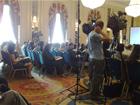 The problem at the European level is that Turkey has a visa-free regime with countries in the Middle East, considered not very friendly by the European Union and the US, like Syria and Iran. The problem gets additionally complicated by EU's wish to sign a readmission agreement with Turkey, a key element to ensure Schengen security and, quite important too, by the way, for Bulgaria and its ambition for membership in the Schengen area. The readmission rule means that illegal migrants that enter Schengen from Turkey must be readmitted by Turkey again. Ankara puts as a precondition to sign the agreement the getting of visa liberalisation. Something which the EU is not prepared to agree with at this stage, in spite of the strong pressure provoked by the events in North Africa and the Middle East.
The problem at the European level is that Turkey has a visa-free regime with countries in the Middle East, considered not very friendly by the European Union and the US, like Syria and Iran. The problem gets additionally complicated by EU's wish to sign a readmission agreement with Turkey, a key element to ensure Schengen security and, quite important too, by the way, for Bulgaria and its ambition for membership in the Schengen area. The readmission rule means that illegal migrants that enter Schengen from Turkey must be readmitted by Turkey again. Ankara puts as a precondition to sign the agreement the getting of visa liberalisation. Something which the EU is not prepared to agree with at this stage, in spite of the strong pressure provoked by the events in North Africa and the Middle East.
Another problem the Turkish business raised in Bulgaria is related to Turkish transport firms. High taxes, heavy procedures at the customs, a wish to be served at 1 stop shop. Turkish transport firms generate huge traffic toward Europe, which can be seen with bare eye on European motorways. There was also a complaint about the protectionist legislation of Bulgaria in terms of labour market. For each Turkish worker, a Turkish company in Bulgaria has to employ 10 Bulgarians. This is possible for big enterprises but is a problem for the very small ones "and instead of getting 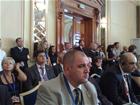 more investments in Bulgaria, thus difficulties are created", Rıfat Hisarcıklıoğlu shared, chairman of the Union of Turkish Trade, Industrial, Maritime Chambers and Stock Exchanges.
more investments in Bulgaria, thus difficulties are created", Rıfat Hisarcıklıoğlu shared, chairman of the Union of Turkish Trade, Industrial, Maritime Chambers and Stock Exchanges.
"I like one Bulgarian saying very much - whatever there is in the bag, that would be in the soup. Whatever politicians put in the bag, this is what we the businessmen will be able to offer in the soup", Mr Hisarcıklıoğlu added. He begged on behalf of all representatives, who spoke during the business forum, politicians of both sides to solve the problems. "Where there is business there are problems. If there is no business, there are no problems. But with your orders we sincerely believe that they will be solved, especially for the Turkish transport firms from an export perspective. Bulgaria, which is our door to Europe, is essential for us", Rıfat Hisarcıklıoğlu said.
The response
"We, the politicians, have no right to hide behind one or another expert opinion. We have to take our responsibility, to express clearly our political will", President Georgi Parvanov said. Regarding visas Bulgaria's head of state said after a face to face meeting with Abdullah Gul, that Bulgaria's visa policy is part of the European one. "Of course, when we talk about specific elements of this problem, I think it has to be a subject of discussions in the framework of the Joint Committee". He, on his turn, raised before his Turkish counterpart his own "favourite" topic - energy. According to him, the "not unessential matter about the gas interconnection between Bulgaria and Turkey, must be accelerated. A matter, which is easy to solve and which requires the efforts of the executive and the companies that are involved with this job".
The Turkish president almost did not touch the energy issue, but focused primarily on his country's economic development and the partnership with the Bulgarian business. Turkey has the ambition to invest in the development of thermal tourism in Bulgaria. "Bulgaria has very good natural gifts, especially in the area of thermal tourism. Bulgaria is one of the rare places in the world. Soon you will see a film about places which the Ottoman empire sultans used to visit. This is why these places need investment, they need to be developed and modernised. Of course, this will speed up significantly the touristic exchange".
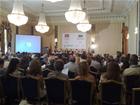 Abdullah Gul also quoted the several times mentioned data about touristic exchange. In 2010 Turkey welcomed 30mn tourists, of which almost a million were Bulgarians (1.4mn). Instead, only around 40,000 are the Turkish citizens who visited Bulgaria. Again because of the visa regime.
Abdullah Gul also quoted the several times mentioned data about touristic exchange. In 2010 Turkey welcomed 30mn tourists, of which almost a million were Bulgarians (1.4mn). Instead, only around 40,000 are the Turkish citizens who visited Bulgaria. Again because of the visa regime.
No word about the EU
A curious detail from the visit of the Turkish president in Bulgaria was that the EU, of which Bulgaria is a member and Turkey is having difficult negotiations with, was not mentioned at all. The simple fact that the official Turkish delegation spoke only about its economic development and about Turkey's business access in the EU shows how long ago Bulgaria had to formulate, for its own sake, an opinion what it expects from Turkey, how it sees it as a partner in the EU and not the less significant question - when. euinside has for a long time thought that in Bulgaria this topic is rarely discussed, which is why we organise, together with the European Institute for Strategies and Policies | ESPI and StratCom, a discussion, entitled: "Turkey and the EU: formulas for common future". The conference will take place on July 13 2011.
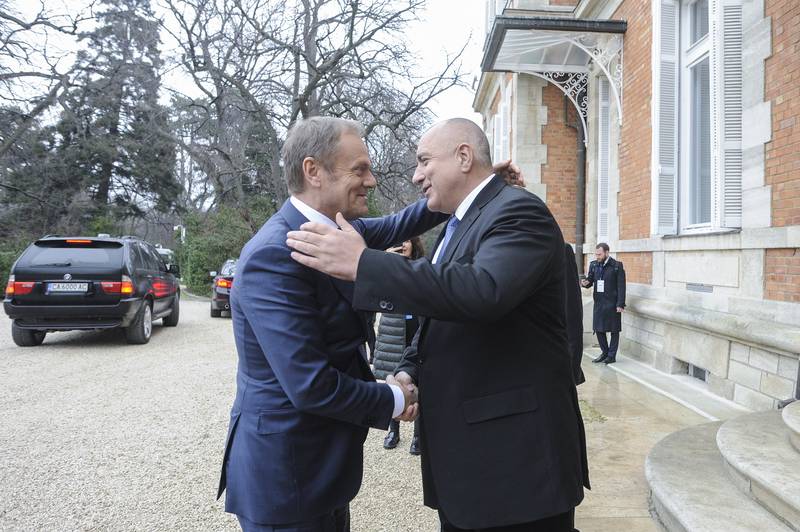 Donald Tusk, Boyko Borissov | © Council of the EU
Donald Tusk, Boyko Borissov | © Council of the EU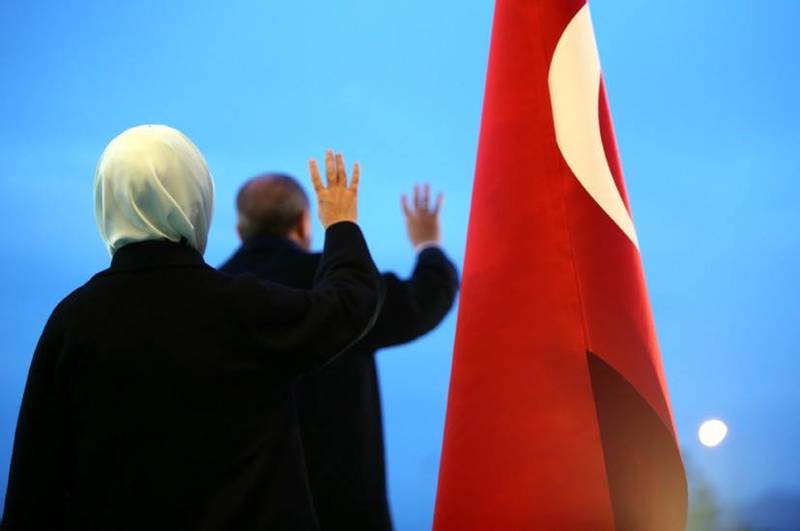 | © Turkey Presidency
| © Turkey Presidency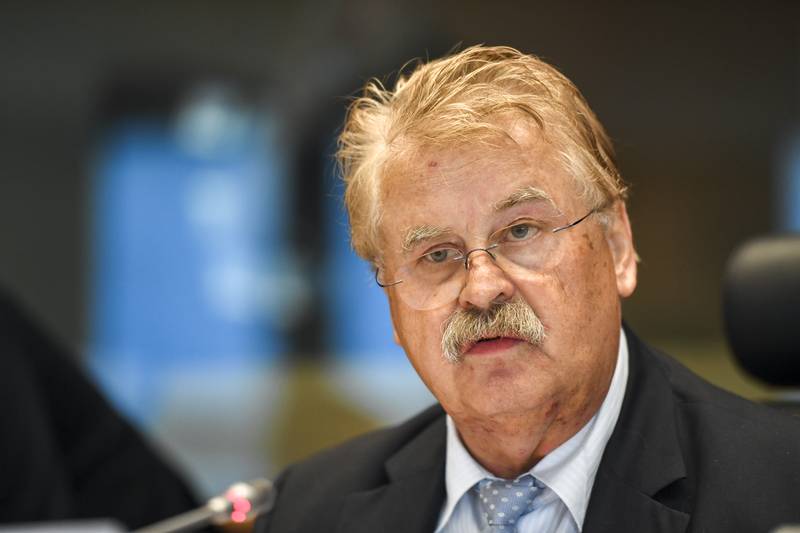 Elmar Brok | © European Parliament
Elmar Brok | © European Parliament